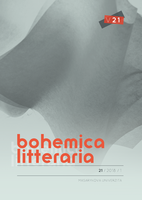Alegorické a reálné v románu a filmu Cesta
The Allegorical and the Real in the Novel and the Film The Road
Author(s): Petr BubeníčekSubject(s): Ethics / Practical Philosophy, Social Philosophy, Novel, Film / Cinema / Cinematography, American Literature
Published by: Masarykova univerzita nakladatelství
Keywords: Novel; film; adaptation; the event (Derrida); the real (Lacan);
Summary/Abstract: The study is concerned with The Road, a post-apocalyptic novel by Cormac McCarthy, and with its film adaptation. It follows the artistic configurations involved, as they reduce people to their biological foundations while, at the same time, pointing to the survival of rudimentary ethical consciousness even in individuals living in extremely strained conditions. The film, especially, shows the downfall of the protagonist into post-apocalyptic horror as leading to the eventual discovery of his quintessential humanity. Moreover, the text by McCarthy can also be read as a postmodern argument against the rationale of modernism: instrumental behaviours stand opposed to ethical behaviour, which is irrational in that it disadvantages those who engage in it. The study examines why, in McCarthy, this divine, ethical principle does not go the way of the rest of the bygone symbolic system, i.e. devolves into a mere phantasma.
Journal: Bohemica litteraria
- Issue Year: 21/2018
- Issue No: 1
- Page Range: 156-168
- Page Count: 13
- Language: Czech

